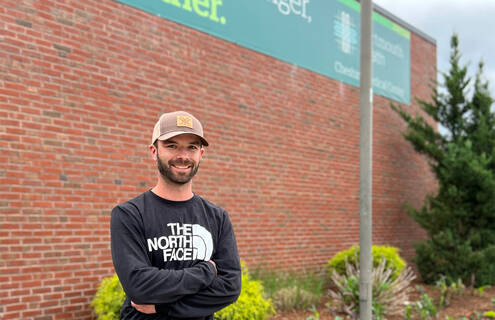
I am just grateful that they saved my life and from potential permanent brain damage. Without them, I don’t know what would’ve happened.
Brendan Woods, Emergency Department patientBrendan Woods wasn’t supposed to survive the accident.
In February, he was out ice fishing with friends when a snowstorm came in, so they started packing up to leave. But all went wrong when Woods, 33, tried to load his ATV back onto his truck.
The truck was parked on an unlevel surface, causing the ATV to slide off and land on Woods.
“It was like five minutes later that I stood up and I knew something wasn’t good because my head hurt really bad, there was a lot of blood,” Woods recalled.
His friends had called 911 and, despite the snow, ambulances arrived to assess Woods and take him to Cheshire Medical Center. During the ambulance ride, Woods remembers being conscious and talkative.
Once at Cheshire’s Emergency Department, Woods was assessed by Maria Eberle, MD. In addition to a brain bleed, he also had three broken ribs.
Woods remembers feeling “a little fuzzy” at this point, and struggled to lift his right arm when Eberle asked him to. Eberle then asked Woods what his name is.
“I basically just looked up at the lights in the ceiling and was like ‘Um,’ ” Woods said. “So that’s when we knew something was changing really rapidly and something had to be done.”
Normally, a patient with a severe head injury would be airlifted to a trauma center for further care. But with the snowstorm in place, Woods had to stay at Cheshire until an ambulance could get there and take him to Baystate Medical Center in Massachusetts.
Eberle and J. Paul Sanders, MD, chief of surgery, stepped into action to stabilize Woods before his transport. The pair used a hand-crank drill that bores into the skull to relieve the pressure and fluid build-up.
"Without this intervention, he would have had severe neurologic damage by the time the ambulance arrived, and was expected to die before or during the four-hour wait for the ambulance and three-hour trip to Bay State," Sanders said.
Now, several months later, Woods said he’s doing great. He was out of work for the City of Keene for three weeks following the accident, but otherwise, said it’s “like nothing even really happened.”
Because of the care he received, Woods honored Eberle and Sanders with Cheshire’s Circle of Gratitude, a program that allows patients and families to share their appreciation of our staff.
“I am just grateful that they saved my life and from potential permanent brain damage,” Woods said. “Without them, I don’t know what would’ve happened.”
He added that this experience showed him “there’s really not a whole lot” Cheshire can’t handle.
“It’s their job to help people, and that’s why they do it. They take pride in it,” Woods said. “Just know that you are in good care when you come here.”